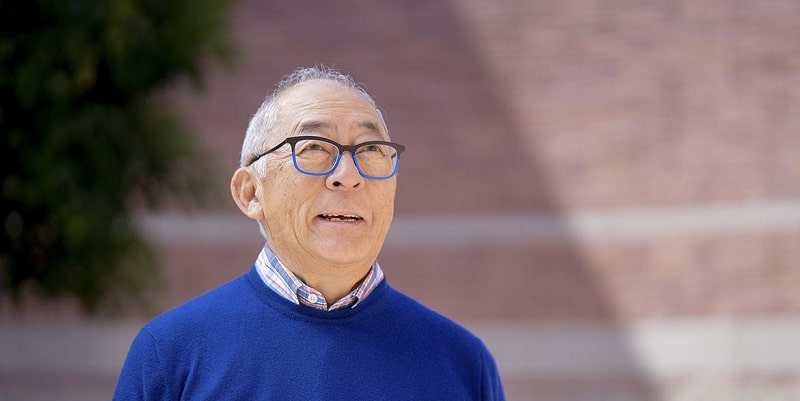William Ouchi biography and books

William Ouchi (dr. William G. Ouchi, 1943) is an American Emeritus Professor at the UCLA Anderson School of Management. William Ouchi is an author and expert in the field of management and organizational systems and founder of the famous management theory: Theory Z.
He authored the New York Times bestseller ‘Theory Z: How American Business Can Meet the Japanese Challenge,’ in which Ouchi features a combination of Douglas McGregor ’s Theory X and Y.
Moreover, he authored various books regarding school systems such as ‘Making Schools Work: A Revolutionary Plan to Get Your Children the Education They Need’, and ‘The Secret of TSL’, a guide to the revolutionary reforms that are changing public education.
The biography of William Ouchi
William Ouchi was born in Honolulu. He spent his childhood in Hawaii and attended the Punahou School where he graduated in 1961. He studied a bachelor administration in Political Economy at Williams College in 1965. William Ouchi graduated with an honorary degree and continued his studies with an MBA in Business Administration from Stanford University in 1967. He next obtained his Ph.D., also in Business Administrations but at the University of Chicago in 1972.
After his studies, William Ouchi worked as a co-chair member at UCLA Anderson School of Management. He started to research to new ways to organize large and public school systems to improve students accomplishments.
Various research of William Ouchi has been published in his books and publications. Next to this, he also served as a Distinguished Professor of Management and Organizations, and a Sanford and Betty Sigoloff Chair in Corporate renewal, both at UCLA Anderson School of Management in Los Angeles.
He additionally both co-founded the Riordan Program, a part of the UCLA Anderson School of Management that provides leadership and management training to diverse individuals. He also is the chairman of this program.
His expertise was and still is in high-demand, and because of this, William Ouchi served as Special Policy Advisor to the Los Angeles Mayor Richard J. Riordan in 1993. He consequently additionally worked as Mayor Riordan’s Chief of Staff from 1993 until 1995, and he also was a Trustee of the William College.
He made significant and substantial contributions in educational- and other organizational systems, particularly in management systems. Due to his publications, he became globally known. He was able to identify which schools visualize quality in educational systems and he was able to make schools accountable for students results.
Many of his publications such as ‘Making Schools Work: A revolutionary plan to Get Your Children the Education They Need’ has already been implemented by various school systems in New York, Chicago, Oakland, and Hawaii. His point of view is universal and can be used be used at any school or other organization.
His research regarding how to improve efficiency in large and complex organizations, and how these can be restructured, has already been applied by many organizations in multiple industries, including retail chain stores, automobile industry, and federal agencies.
He serves on the board of the Los Angeles Alliance for College-Ready Public Schools, an organization with a network of high-performing high schools and middle schools in low-income communities dedicated to providing exceptional public education to all students, regardless of their background or geographical location.
The same accounts for the Hilton Foundation, an organization dedicated to alleviating human suffering, where William Ouchi also serves on the board since 2006. The organization is continually seeking ways to improve the lives of disadvantaged and vulnerable people throughout the world.
William Ouchi is also actively involved for approximately twenty years on the board of business-related enterprises such as Sempra Energy, a Fortune 500 company which continuously seek sustainable energy solutions for every-day consumers.
His view and thoughts related to innovating organizational systems have been utilized by various organizations such as FirstFed Financial Corp, First Federal Bank of California, EduVoice, Allegheny Technologies, AECOM, Pacific Enterprises, Jandy, and various other organizations at which he worked as a director. Next to his contributions, William Ouchi furthermore served on the editorial boards of numerous scholarly journals and an advisor to granting agencies.
He received several teaching awards, including the UCLA Medal of Teaching Excellence and other awards such as the Asian Woman Warrior Award, and the Grand Prix des Meilleurs Livres de Management for his book ‘Theory Z: How American Business Can Meet the Japanese Challenge’.
William Ouchi recently retired as a Distinguished Professor of Management and Organizations, and a Sanford and Betty Sigoloff Chair in Corporate renewal, both at UCLA Anderson School of Management in Los Angeles in 2017
He still is an independent director at Sempra Energy, but he also serves as a Vice Dean-Executive at the University of California, and as an Associate Director at Clinical Translation Science Institute.
His contributions look to be forever lasting. He spent his life and career improving organizational systems and helping poor and disadvantaged people. He believes in equal opportunities and sees chances where others find challenges. He currently lives together with his wife Carol in Santa Monica. The couple has three children and five grandchildren who live in Los Angeles.
Famous quotes
- “The evidence strongly suggests that a consensus approach yields more creative decisions and more effective implementation than does individual decision making.”
- “Theory Z is an approach to management based on a combination of American and Japanese management philosophies.”
Books and publications by William Ouchi et al.
- 2009. The secret of TSL: The revolutionary discovery that raises school performance. Simon and Schuster.
- 2008. Making schools work: A revolutionary plan to get your children the educ. Simon and Schuster.
- 2006. Power to the principals: Decentralization in three large school districts. Organization Science, 17(2), 298-307.
- 2003. Organizational configuration and performance: The case of primary and secondary school systems. Los Angeles: University of California, Anderson School of Management. Retrieved March, 24, 2005.
- 2003. Making schools work. Education Week, 23(1), 56-56.
- 2002. 16 Japanese-style Partnerships: Giving Companies a Competitive Edge. Managing Innovation and Change, 203.
- 1994. The organization of innovation in the United States and Japan: Neoclassical and relational contracting. Journal of Management Studies, 31(5), 653-679.
- 1993. Hierarchies, clans, and theory Z: A new perspective on organization development. Organizational Dynamics, 21(4), 62-70.
- 1991. Markets, bureaucracies and clans. Markets, Hierarchies and Networks. The Coordination of Social Life, edited by Grahame Thompson, Jennifer Frances, Rosalind Levacic, and Jeremy Mitchell. Sage, 246-255.
- 1990. The economics of organization. In Human Resource Management in International Firms(pp. 7-17). Palgrave Macmillan, London.
- 1989. The new joint R&D. Proceedings of the IEEE, 77(9), 1318-1326.
- 1988. The logic of joint research and development. California Management Review, 30(3), 9-33.
- 1986. Organizational economics. Jossey-Bass.
- 1985. Organizational culture. Annual review of sociology, 11(1), 457-483.
- 1984. The m‐form society: Lessons from business management. Human Resource Management, 23(2), 191-213.
- 1984. Political and economic teamwork: The development of the microelectronics industry of Japan. California Management Review (pre-1986), 26(000004), 8.
- 1984. Information cost and organizational governance. Management Science, 10, 460-481.
- 1983. Efficient cultures: Exploring the relationship between culture and organizational performance. Administrative science quarterly, 468-481.
- 1982. Theory z. Avon.
- 1981. Theory Z: How American business can meet the Japanese challenge. Reading, Mass: Ad-dison-Wesley.
- 1981. Theory Z corporations: Straddling US and Japanese molds. Industry Week, 209(3), 48-54.
- 1981. The markets and hierarchies and visible hand perspectives. Perspectives on organization design and behavior, 347-370.
- 1981. Organizational paradigms: A commentary on Japanese management and Theory Z organizations. Organizational Dynamics, 9(4), 36-43.
- 1981. Going from A to Z: Thirteen steps to a theory Z organization. Management Review, 70(5), 8-16.
- 1981. A rejoinder. Perspectives on Organization Design and Behavior, New York, 387-390.
- 1980. The markets and hierarchies program of research: Origins, implications, prospects. University of Pennsylvania, Center for the Study of Organizational Innovation.
- 1980. A framework for understanding organizational failure. The organizational life cycle, 395-429.
- 1979. A conceptual framework for the design of organizational control mechanisms. In Readings in accounting for management control(pp. 63-82). Springer, Boston, MA.
- 1978. Types of organizational control and their relationship to emotional wellbeing. Administrative Science Quarterly, 293-317.
- 1978. Type Z organization: Stability in the midst of mobility.
- 1978. Social Structure and Organization. Environments and Organizations, Marshall W. Meyer (ed.). San Francisco: Jossey-Bass.
- 1977. The relationship between organizational structure and organizational control. Administrative science quarterly, 95-113.
- 1977. Markets and Hierarchies: Analysis and Antitrust Implications.
- 1975. Organizational control: Two functions. Administrative science quarterly, 559-569.
- 1974. Structure, technology and environment. Organizational behavior: Research and issues, 107-40.
- 1974. Defining the span of control. Administrative Science Quarterly, 357-365.
How to cite this article:
Zeeman, A. (2018). William Ouchi. Retrieved [insert date] from Toolshero: https://www.toolshero.com/toolsheroes/william-ouchi/
Original publication date: 05/18/2018 | Last update: 04/06/2023
Add a link to this page on your website:
<a href=” https://www.toolshero.com/toolsheroes/william-ouchi/”>Toolshero: William Ouchi</a>











